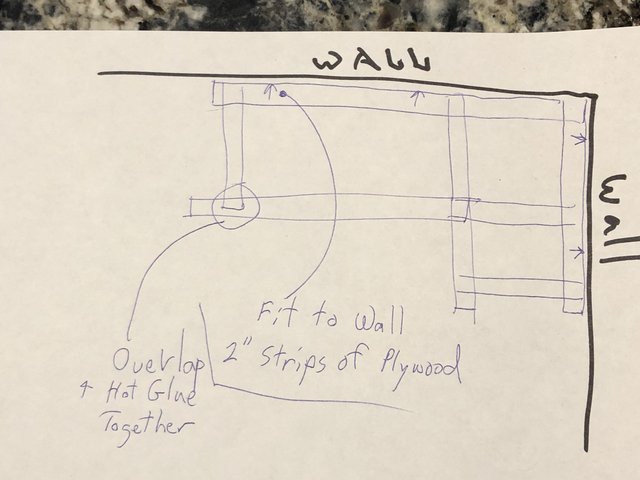Go  | New  | Find  | Notify  | Tools  | Reply  |  |
| Help! Help! I'm being repressed!  |
I'm making a desk out of some hardwood plywood. It's in the shape an L and is 52x63 and 20 inches deep. The desk will be supported by brackets I have bolted into the studs so it doesn't have legs. I'm trying to wrap my head around the process of scribing both walls. Is this process correct? Scribe the long side first and then take the thickest part that needs to be removed and offset by that amount when I scribe the other wall. So if the most that needs to be removed on the long side is 1/2" then I would put the point of the compass in the corner like normal, but would tilt the pencil portion down the desk by 1/2". Is that right? Is there an easier way I'm missing? | ||
|
Member |
If I'm understanding what you're doing correctly, it would seem that you would want to check both sides and choose the largest dimension irrespective of what side it's on, long or short. If you were to do the long side and find that it was 1/2" out as you used in your example, there would be a problem if the other side was off by a greater distance and you set your compass to 1/2". | |||
|
| Member |
The professional Granite installers I have worked with make a template out of 1/4 strips of plywood skeleton glued up that they fit to the wall. When they get a perfect fit with the cheap sacrificial plywood they then transfer/trace it onto the actual top to cut. Or you take the easy way out and add a backsplash to cover any gaps.  Endeavor to persevere. | |||
|
Quit staring at my wife's Butt |
exactly how I would do it the thin strips are easy to scrip then just transfer it over and make any minor adjustments. Cabinetmaker for 35 years. | |||
|
| Member |
As with everything in life, it really depends on how irregular your walls are. I'd slide an 8' long by 1' wide piece of 3/4" plywood with a freshly cut and perfectly straight edge up against the wall and survey how irregular it is. If you're lucky it will be close. If that's the case, cut your desktop slightly oversized (like a 1/4") slide it in place and up against the wall, and take a sharpened carpenter's pencil held vertically against the wall and run it the entire length of the top. Then use a belt sander and remove whatever material you need to to get down to the line. Again, if your walls are fairly straight, this should be an easy process. ----------------------------- Guns are awesome because they shoot solid lead freedom. Every man should have several guns. And several dogs, because a man with a cat is a woman. Kurt Schlichter | |||
|
| drop and give me 20 pushups |
Using XLT"s suggestion will show how far the corner is out of square either opened up or closed in faster when layed on top of the actual counter top.. .. When making the framework of the pattern support the counter top near position which will support the frame work while you use 1/4 plywood 3 inch wide strips and where strips cross each other use a hot glue gun or contact glue that will hold the frame from moving. Then take a compass or pencil layed flat vertically and trace the wall shape. Use a jig saw or belt sander to shape the form that matches the wall the transfer this pattern to the actual counter top...... Or support the top in position and trace wall with compass or flat pencil working longer edge first getting a fit then the short edge. If the gap is greater than a pencil then use a compass set for the greatest gap that when trimed there should be a snug fit. If space is not that bad then possibly install a back splash You did not say if one or both ends of top will be open or up against a wall.. If so then the plywood frame might be easier and or faster if you do not have a extra set of hands to help hold things. .. Been there/done that/ got several t-shits. 35 yrs cabinet maker retired. .............................. drill sgt. | |||
|
| Fortified with Sleestak |
This vid might help a bit. I have the heart of a lion.......and a lifetime ban from the Toronto Zoo.- Unknown | |||
|
| Donate Blood, Save a Life!  |
Good advice here if you’re looking for a craftsman-type look. We built desks similar to this for about 25 stations in a new office space about 20 years ago. There were so many variations in the various walls, we settled on a standard pattern and then used 3/4” quarter round to cover the resulting gaps where it mattered, and left the gaps alone where it didn’t. *** "Aut viam inveniam aut faciam (I will either find a way or make one)." -- Hannibal Barca | |||
|
| Help! Help! I'm being repressed!  |
Thanks for the input. Hadn't thought of making a template. Going to go grab a sheet of poster board and cut it into strips and give it try. Thanks | |||
|
| Powered by Social Strata |
| Please Wait. Your request is being processed... |
|
© SIGforum 2025